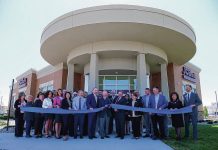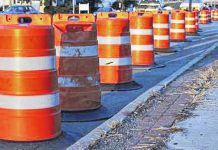Columbus is adding stop signs and no-parking signs in three areas of the city to improve safety.
The Columbus Board of Works on Tuesday approved installing all-way stops at the intersection of Center and Southeastern streets on the southeast side after a request was received by the city. The intersection is currently controlled by stop signs for northbound and southbound traffic on Center Street.
The city also plans to install no-parking signs on the west side of Clairmont Drive between Bridgepointe Drive and Deerbrook Drive in the Bridgepoint subdivision east of Columbus Municipal Airport, said Dave Hayward, executive director of public works/city engineer.
A request had been received by the city engineering department indicating that when vehicles are parked on both sides of the street, the street is too narrow and creates an unsafe situation, Hayward said. Currently, the street has no parking restrictions, he said.
The board also approved a recommendation from Hayward to remove an all-way stop at the intersection of Middle Road and Arnold Street, also near the airport. It has been changed to a T-intersection due to the construction of a new airport hangar north of the intersection, Hayward said.
The city intends to install a stop sign for northbound traffic on Middle Road, he said.
A fourth request to install an all-way stop at the intersection of Chapel and Mission Drives on the east side was denied. Hayward said the intersection didn’t have enough traffic to support a change. It is currently controlled by a stop sign for southbound traffic on Chapel Drive.
Hayward said the city receives traffic-oriented requests based on factors such as speed, traffic counts and site visits.
“We try to anticipate what the ripple effect might be,” Hayward said.
The traffic control improvements approved by the board will be in place by early next week, he said.
The board also approved a resolution concerning a policy for the use of children-at-play and special-needs-child signs, which are two different types of signs.
The policy sets out requirements for individuals requesting a special-needs-child sign that includes the name of the parent or guardian of the child, the address of where a sign is requested and the age of the child.
The policy, developed after it was determined to be a reasonable accommodation under the federal Americans with Disabilities Act, says that approval and installation of the signs would be limited to local streets in Columbus, Hayward said.
Residents would not be charged to have a special-needs-child sign installed, he said.




